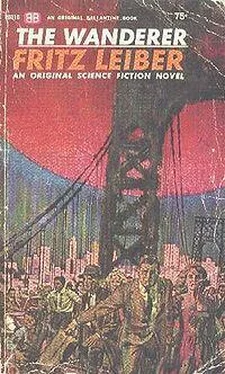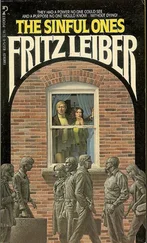Or perhaps, it occurred to him, this was all taking place in a single instant, outside time.
Don Merriam could not tell which of these, or some yet unimagined other, was the basis of his experience. He could only flit and plummet and see.
At first his movements were limited to empty corridors and shafts. Or if there were beings or perambulating machines or small ships in them, they were blurred to invisibility by the speed of his passage. The rule was that for a few instants he would travel almost as fast as light, it seemed, aware only of the general shape and attitude of the passageway he was traversing; then he would float rather slowly for a brief space, able to glimpse all that was immediately around him; then he would dart off again, in part involuntarily, in part because an imperious urge to see something else would take hold. This process went on interminably, yet without weariness or boredom, as though time were unlimitedly telescoped.
Gradually the three-dimensional picture firmed in his mind of the Wanderer, artificial throughout, globe within globe of floors — fifty thousand of them at least — everywhere veined with corridors, like a vast silvery sponge. Many of the great wells did go all the way through the planet, intersecting at its center in an immense empty globe that had a dark sky of its own glittering with random lights like stars between the mile-wide holes of the pits with their darkness and their softly glimmering lights.
But although his imagination surged delightedly with its increasing grip on the structure of the Wanderer, one feature of the planet oppressed and then began to frighten him, more by its implications than by its simple nature: the thirty-yard-thick skin of dark metal that was its silver-filmed roof — the ground on which the Baba Yaga and the Soviet moon ship had landed — and the mile-wide rounds of equally thick metal set to swing across the mouths of the pits, sealing up the planet like a fortress.
Re-enforcing this particular ominousness were sets of great coils circling some of the planet-piercing pits, as if the pits might sometimes serve as monstrous linear accelerators.
Recoiling inward from the forbidding armor plating, Don found himself again in the very center of the star-speckled, central immensity. It might be only twenty miles across, but now it seemed a universe, and the great holes in its starry sky doorways to other universes, and he felt that there were invisible beings around him, impalpable thinking mists that lived in the cold intergalactic depths of space, and this engendered in him a sudden fear sharper than had the planet’s defensive skin.
It was perhaps this sharper fear that launched his winging vision on its second exploration of the Wanderer. He no longer stuck to corridors, but flashed without flinching through wall after wall, aware of the thickest of them only as a fleeting blink in his seeing as he sped through room after room. And now when he paused, it was always near living beings. These living beings were not of one sort, but many.
Although felinoids or cat-people like his conductor formed a large minority of the Wanderer’s crew, especially near the planet’s surface, there were beings that seemed an end product of almost every line of terrestrial evolution, and unearthly lines, too: great-headed horses with organs of manipulation nesting in their hooves; giant, tranquil-eyed spiders pulsing at their joints with a strongly pumped arterial blood-flow; serpents with large and small grasping tentacles; glintingly scaled and gorgeously crested humanoid lizards; beings shaped and moving like thick wheels with a counter-rotating central brain and sensorium; land-dwelling squid that stood proudly on three or six tentacles; and beings seemingly inspired by such creatures of myth as the basilisk and the harpy. These last Don found deep in the planet, winging about in a room like a gigantic aviary. This room, so big that it occupied many floors — an interior world — was grown over with slim, multibranching trees with tiny leaves, and lighted by a dozen great floating lamps like suns.
Some of the turquoise lakes he had glimpsed from the Baba Yaga were as deep as they were wide, and in them dwelt great-eyed and presumably vast-brained whales with arms like cables fingered at the ends with filaments. And beside the whales swam other seemingly intelligent, mobile-visaged sea beings.
Don wanted to stop and study all of these beings, observe their actions in detail, but always the urge to see some yet more mysterious or wonderful life form was greater, with the result that his pauses were hardly longer than when he had been hurtling along the empty avenues. In no case did the beings he observed appear to be aware of his presence.
None of the life forms seemed to keep racial privacy: there had been a few cat-people engaged in apparently amicable converse with the smaller harpies in their aviary-world, and there had been giant spiders arm-oaring in translucent diving suits through one of the deep lakes of the whales.
It began to seem incredible to him that the variety and numbers of the beings he was spying on could be held by an Earth-size planet, but then it occurred to him that with her decks the Wanderer had about 15,000 times the surface area of Earth.
Despite their numbers and variety, most of the beings he watched so briefly appeared to be urgently busy. Even the motionless ones seemed to be rapt in work — crucial cogitations. There was an omnipresent sense of crisis.
Occasionally, as if by a failure of flight pattern, or perhaps for relief, Don would pause in a room without living occupants: great tanks filling up with moon rock; halls of silent glowing machinery and pipes coursing with fluids of many colors; rooms of strange vegetation sunlit by lamps — only these might be intelligent plants; rooms of smoothly geometric structures that seemed on the verge of life, like those on the Wanderer’s surface; spherical rooms filled with pure, raw, fiery sun-stuff, although it neither burned nor blinded him.
Occasionally he saw physical work being done by artificial-seeming protoplasmic beings like giant amoebas whose manipulatory columns and sense organs varied with the task being performed. Elsewhere there labored metal robots counterfeiting spiders, wheel-beings, and many other life forms — though some of these robots seemed truly alive, as did certain large structures like gigantic electronic brains. Their transparent walls showed dark jellies glinting with tangled silvery lines finer than hairs, as if they grew nerves and thought-cells as needed.
The greater the variety of intelligent life Don saw, the more he became sensitive to its presence. Now, when he paused in the star-specked central globe, it seemed to swim with faint violet mist-beings of everchanging shape and multi-armed: cold creatures of the darkness beyond the stars. And once when he soared briefly to the upper deck, he glimpsed one of the great colored abstract forms split like an egg and spill out a horde of beings.
Yet the more sensitive he became to the presence of intelligent life, the more he was racked by the conviction that there were all around him invisible forms of it beyond his sensing — as if the Wanderer had more ghosts aboard than all her crew members.
He paused in a profoundly still room of many balconies and almost an infinitude of cases of tiny drawers, like the card catalogue room of a library. Filament-like tracks led from the drawers to viewing instruments suggesting great microscopes, and it seemed to Don that there was travel along the multiplicity of cobwebs, and he had the thought that here servile microbes and viruses were sorting and ordering for inspection molecules on which were etched the total knowledge of races and the histories of worlds. All Earth’s thought and culture, he told himself, would easily fit into just one of the tiny drawers. It was almost as if he brushed here the universal, all-encompassing viewpoint of eternity which is sometimes called God.
Читать дальше










